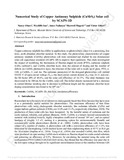Please use this identifier to cite or link to this item:
http://ir-library.mmust.ac.ke:8080/xmlui/handle/123456789/2278| Title: | Numerical Study of Copper Antimony Sulphide (CuSbS2) Solar Cell by SCAPS-1D |
| Authors: | Obare, Nancy isoe, Wycliffe Nalianya, Amos Mageto, Maxwell Odari, Victor |
| Keywords: | Numerical Study of Copper Antimony Sulphide (CuSbS2) Solar Cell by SCAPS-1D |
| Issue Date: | 27-Jul-2023 |
| Publisher: | Heliyon |
| Abstract: | Copper antimony sulphide has ability in applications on photovoltaics since it is a promising, less toxic, earth abundant absorber material. In this study, the photovoltaic characteristics of copper antimony sulphide (CuSbS2) photovoltaic cell were simulated and studied by one dimensional solar cell capacitance simulator (SCAPS-1D) to improve their operations. This study investigated the impact of modifying the thicknesses of fluorine-doped tin oxide (FTO), cadmium sulphide (CdS), carbon(C), and CuSbS2 absorber layer, Also the amount of doping and the number of defects on CuSbS2 photoactive layer, the structure of the solar cell is made up of glass, FTO, n-CdS, p-CuSbS2, C, and Au. The optimum parameters of the designed photovoltaic cell yielded 0.9388 V of open-circuit voltage (Voc), the short-circuit current density (Jsc) was 28.31 mA/cm2, the fill factor (FF) of 60.8%, and the solar cell efficiency of 16.17%. The ideal thickness was discovered to be 300 nm for the CuSbS2 solar cell. The defect density increment led to a decrease in carrier lifetime resulting also to decrease in diffusion length and the optimum absorber layer doping concentration was found to be 1018 cm-3 |
| URI: | https://papers.ssrn.com/sol3/papers.cfm?abstract_id=4514593 http://ir-library.mmust.ac.ke:8080/xmlui/handle/123456789/2278 |
| Appears in Collections: | Gold Collection |
Files in This Item:
| File | Description | Size | Format | |
|---|---|---|---|---|
| SSRN-id4514593.pdf | 249.38 kB | Adobe PDF |  View/Open |
Items in DSpace are protected by copyright, with all rights reserved, unless otherwise indicated.
